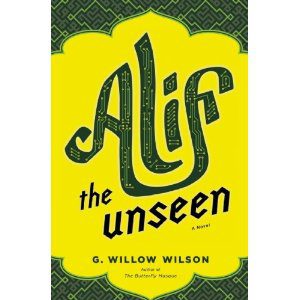
But the simple truth is that Willow creates worlds. Her graphic novel Cairo and her comic series Air were just precursors to this work, setting the stage with concepts like the Undernile and the “lost country” of Narimar that deliberately straddle the line between mythology and the modern, firmly grounded in Islamic culture without recycling overused elements of Western fantasy. Even her memoir The Butterfly Mosque captured a vision of a real-world Cairo as unto another world, from the raw perspective of an American expat gone native without any orientalist condescension.
But Alif breaks new ground. There’s a reason it picked up a coveted review from the New York Times, and why in that review Willow is likened to J.K. Rowling, but I think a far better comparison is to Neil Gaiman. In a very real sense this is her American Gods. But the book also has a geek chic to it, which has a very Neal Stephenson vibe – there’s a celebration of the hacker-activist here that sets a programmer as a hero and a dictator as an enemy. So in another sense this book is Willow’s Snowcrash. What is so exhilarating about this book is the idea that there’s a relationship between computer code and mythological narratives, that both are just forms of stories that have power in the real world. From the prologue of the book, this relationship is made explicit, in an exchange between a man and a jinn:
What do you want? the creature whimpered. Why do you force me to tell you what I should not? These are not your stories. They are ours.
“They are yours, but you don’t understand them,” snapped Reza. “Only Adam was given true intellect, and only the banu adam have the power to call things by their right names. What you call the bird king and the hind and the stag–these are only symbols to disguise a hidden message, just as a poet may write a ghazal about a toothless lion to criticize a weak king. Hidden in your stories is the secret power of the unseen.”
The stories are their own message, said the thing, with something like a sigh. That’s the secret.
“I will assign each element of each story a number,” said Reza, ignoring this alarming pronouncement, “And in doing so determine their quantitative relationship to one another. The resulting code will allow me to replicate that quantitative relationship in other forms–metal, earth, flesh–and I will gain power over them–” He broke off. A breeze had stirred through the open window, and the scent of drying varnish wafted toward him. Reza thought of his wife.
You’ve lost something, said the creature shrewdly.
“It’s not your problem.”
No story or code or secret on earth can raise the dead.
“I don’t want raise the dead. I just want to know–I want–”
The thing listened. Its yellow eyes were fixed and unblinking. Reza remembered the herbal remedies, and the cupping, and the incense to clear the air, and the low terse words of the midwives as they moved about the bloody bed, pulling their veils over their mouths to speak to him as he stood by, useless and despairing.
“Control,” he said finally.
And thus in the hands of someone skilled in the Art, can be used to effect change, and achieve control. With the backdrop of the Arab Spring, this is a message that has real relevance; that authentic tradition is just as important as modern technology in shaping destiny, be it as an individual fighting for love or a nation fighting for freedom.
There’s a lot more to Alif than just a political metaphor, of course. It’s a tale of adventure and romance and it’s packed with gems and easter egg references to things like World of Warcraft and Douglas Hofstadter. There’s even a vampire, but not the sparkly brooding kind you’ve come to expect, but something much more.. primal. As Willow herself writes about the inspiration for the book, it came from a “wonderfully clarifying kind of rage” about how she was forced to communicate to her three primary audiences (comic book geeks, literary NPR types, and Muslims) in isolation, and the book manages to bridge those gaps. The result is a book anyone can pick up and from which everyone will take something different away.
This book deserves to be on the NYT bestseller list. Make it happen and get your copy now.

